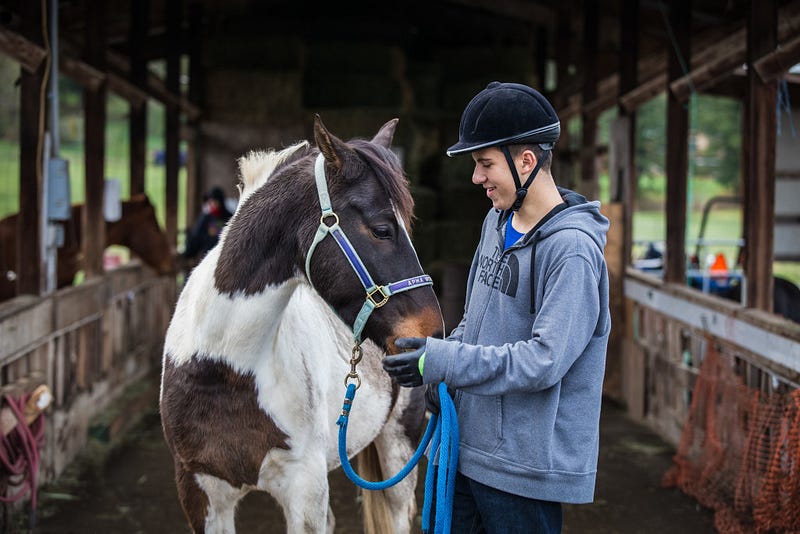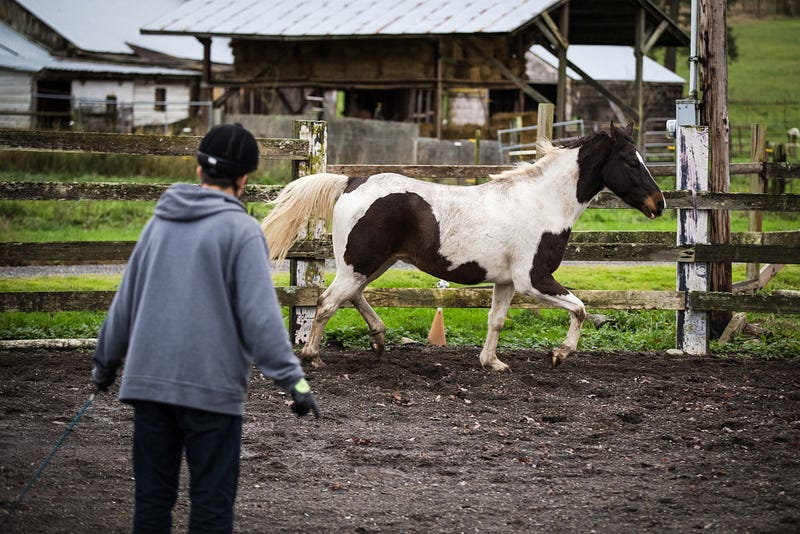Happy Tails
A horse provides healing, skill development and valuable life lessons to children
STORY AND PHOTOS BY KRISTIN FOSTER
(Above) Obi has been a therapy horse at ANT for six years now, helping a wide variety of program participants. Horses mirror peoples’ emotions, often bringing out behaviors a person wasn’t aware of before.
A chestnut and white horse runs around in circles. The horse, Obi, was antsy.
Sonja Wingard and a boy stand watching him.
Obi starts bucking, as an energetic horse acts but the boy doesn’t know horses well. He becomes scared and Obi senses it.
Obi’s behavior switches to prancing next to the gate with his head high, his ears back and his nostrils flaring. He throws himself against the gate, trying to get out. Sonja explains to the boy about how Obi wants to run away, just as the boy had run away from school that day. She says the only way to get out of the pen was to calm down so that Obi would do the same and move away from the gate.
Sonja and the boy do a deep-breathing exercise and Obi eventually comes over and puts his head in the boy’s chest. By learning to calm down not only himself, but also a thousand pound animal, the boy learned to manage himself in school.
“That was the day I knew that Obi would mirror people,” Sonja says. “It was so perfect because even though I didn’t know the boy had run away that day, it was a beautiful unfolding of what the boy needed to learn — that he could calm himself down.”

The boy is one of countless program participants Obi has worked with at Animals as Natural Therapy (ANT), a farm that uses a variety of animals in programs designed to provide therapy for youth and veterans. In the six years Obi has been on the farm, Sonja has found that he loves people. Some horses are more cautious but he usually wants to engage with them. He also gets along well with the herd, neither dominant nor shy.
A lot of horses have come and gone at ANT, but not all horses want to be therapy animals. “The horses that we have here have chosen to be therapy horses,” says Shannon McCune-Dickerson, the program coordinator at ANT. “I think a lot of them take purpose in this.”
Obi has shown his understanding for different program participants and what they need time and time again. With Forrest Close, a 16-year-old boy, Obi appeared as a rebellious teenager. Forrest saw a lot of his own behaviors reflected in how Obi acted with him.
Working with Obi has shown Forrest qualities about himself that he hadn’t previously noticed before. He realized he had habits he needed to change.
Forrest’s mom, Misty Newell, now sees her son showing more accountability, initiative, and self-discipline, as well as learning good communication.
“I think that coming to ANT has given Forrest an opportunity to feel valued by other people and feel valuable in the world, like he has something positive to contribute to the world,” Misty says. “I see that sparkle coming back in his eye.”

Sonja has learned over the years of running ANT that animals, especially horses, are extremely intuitive and tuned in to each individual person. She sees it in all the horses — an understanding of what a person needs and an opinion on which participant they are paired with. Therapy horses will also mirror the child’s emotions that they work with.
In a paper by Dr. Keri Brandt from Fort Lewis College, she explains that horses used in therapy have shown to benefit children in a variety of aspects including an increase in self-esteem, better communication skills and learning to care for themselves.
Sonja founded ANT in 1999, wanting to share her farm and animals with others. At the time, she believed animals just brought a feeling of calmness to people, but as time went on, she learned how therapeutic animals really are. The nonprofit organization now offers a variety of programs to veterans, as well as youth who are recovering drug addicts, have disabilities or need to learn more about themselves and their relationships with others.
Horses are able to confront people in a way that other humans cannot since it is all non-verbal. For horses like Obi, ANT provides a place where animals and people can develop relationships learn to communicate.
